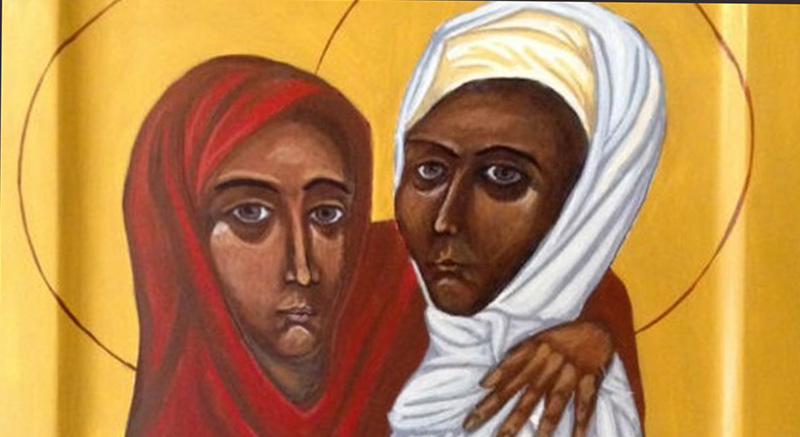(Died 203 AD)
Born in Carthage, the 22-year-old Perpetua recently became a mother and become a Christian as well. Her father implored her to renounce her Christian faith.
Her answer was quite remarkable.
“See that pot lying there? Can you call it by any other name than what it is?”
Her father answered, “Of course not.”
Perpetua responded, “Neither can I call myself by any other name than what I am — a Christian.”
Her father became so angry that he attacked his daughter. When she was arrested, she first looked at her separation from him as a blessing but that would soon change.
Perpetua was arrested with four others, among whom was a pregnant slave called Felicity. The prison was so crowded that Perpetua felt like she was suffocating from the heat. She also remarked that there was no light, commenting, “had never known such darkness.” Her most grievous pain, however, came from the separation from her child.
Two deacons who administered to the prisoners paid guards to allow the future martyrs to be place in better circumstances. There, Perpetua’s mother was able to bring the baby to his mother. Eventually, Perpetua obtained permission to keep the babe with her and then she said, “My prison suddenly became a palace for me.”
Again, her father begged her to renounce her faith to no avail. Even the judge at her trial begged her to forget her Christianity. When she refused, her father forbade his wife from bringing the baby to her for visits.
As dire as her situation was, Perpetua prayed for the well-being and the souls of others. She prayed for her deceased brother Dinocrates, who had died miserably from disfiguring gangrene of the face. Though placed in stocks every day she felt her prayers answered when she had a vision in which she saw Dinocrates healed and clean, drinking from a golden bowl that never emptied.
Felicity’s situation was equally upsetting. It was against the law for pregnant women to be executed. To kill a child in the womb was shedding innocent and sacred blood. Felicity was afraid that she would not give birth before the day set for their martyrdom and her companions would go on their journey without her. Two days prior to execution, Felicity went into labor while she was berated by the jailers. The baby girl she had was given to some Christian women of Carthage.
In her own way, Perpetua gained the respect of the prison guards. When they refused to allow the martyrs to clean up before their execution, she scolded them saying, “We’re supposed to die in honor of Caesar’s birthday. Wouldn’t it look better for you if we looked better?”
The officer blushed with shame at her reproach and started to treat them better. The manner of their dress would come up again in the arena. The Christians refused to don the robes of the pagan gods. Again, Perpetua scolded the executioners saying, “We came to die out of our own free will so we wouldn’t lose our freedom to worship our God. We gave you our lives so that we wouldn’t have to worship your gods.”
She and the others were allowed to keep their clothes.
The men were attacked by bears, leopards and wild boars. The women were stripped to face a rabid heifer. When the crowd, however, saw the two young women, one of whom had obviously just given birth, they were horrified, and the women were removed and clothed again.
Perpetua and Felicity were thrown back into the arena so roughly that they were bruised and hurt. Perpetua, though confused and distracted, still was thinking of others and went to help Felicity up. The two of them stood side by side as all five martyrs had their throats cut.
Perpetua’s last words were to her brother: “Stand fast in the faith and love one another.”
Adapted by A.J. Valentini from: U. (2020, March 4). St.s Perpetua and Felicity. UCatholic. https://ucatholic.com/saints/perpetua-and-felicity
